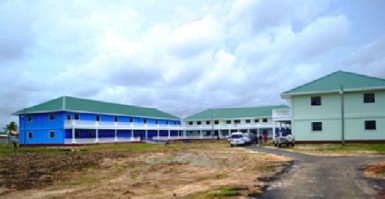By Desilon Daniels
More than a year after it was officially opened, the Hugo Chavez Centre for Rehabilitation and Reintegration at Onverwagt, Berbice will finally begin letting in occupants through its doors.
According to Wentworth Tanner, Director of Social Services within the Human Services Ministry, the home’s opening has been delayed owing to administrative setbacks, such as the training of staff.
However, the first batch of 35 homeless persons will be moved from the Night Shelter in East La Penitence to the Onverwagt facility early next week.
The centre is built to accommodate 180 persons – 120 males and 60 females – who will be privy to a number of benefits including vocational training. They will also be provided transportation, medical assistance and treatment, toiletries, clothing, and meals.

“The home is really for homeless persons; not those with mental illnesses but those who are homeless and are interested in being trained,” Tanner explained. He said the occupants will also be assisted with life skills training, and there will on-staff counsellors. Training will include masonry, carpentry and home management while occupants will also work on a garden from which much of their food will come. “We’re not only dealing with the physical aspect but we hope to retool them mentally,” Tanner added.
He explained that persons from ages 18 to 50 were screened at the Night Shelter and medical assessments were conducted to determine whether they had any preexisting conditions. He further said that focus was placed on persons who are able-bodied and who could be trained with the eventual outcome of reinstatement into society.
“We’ve seen an increase in the homeless persons in Georgetown and rather than just to house them and continue the trend we thought it best to retool them and work with them to reintroduce them to society in a positive manner,” Tanner explained. Though the Night Shelter provides accommodation it does not provide training and counselling for persons who might have had problems, he added.
Tanner further said that the Onverwagt location was chosen not only on the availability of space but also on the opportunity it presented to its occupants for a new start.
“The location is to take them out of the environs that contributed to their delinquency. We wanted to put them out of the way of the negative elements that might drive them to doing things they don’t want to do,” Tanner said.
Occupants will not be allowed to stay indefinitely at Onverwagt; their stay will depend on just where they are psychologically.
The centre is currently fully-staffed with over 30 workers; recently, 10 orderlies were hired. It was funded by the government of Venezuela at the cost of US$2 million and rests on 7.3 acres of land.




